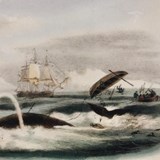Milford Haven and its Whaling Past
Sir William Hamilton had grand plans to develop a town and dock on the eastern end of Hubberston Pill, a tidal inlet on his estate. These developments needed to be paid for by trade.
The initial idea for the Royal Navy to build ships was short lived as the RN decided to move up the river and built its own dockyard at what is now Pembroke Dock.
The decision was made to invite a group of whaling ship owners, from the East Coast of the USA, to set up a base for whaling activities at Hubberston Pill. This proved to be the beginnings of the town of Milford Haven. These owners were Quakers who were finding life in America difficult as they had refused to fight in the American War of Independance and severe import tarrifs were put on the whale oil they were importing.
Several families, in 13 ships, agreed and set sail for West Wales arriving in June 1792.They quickly settled into local lodgings and the ships they arrived in were provisioned and set of for the whaling grounds. While Eurpoean whalers tended to fish in the north Atlantic the Americans opted for the southern oceans where the sperm whales could be caught. The oil from sperm whales was of superior quality so commanded better prices.
Whaling was always a cruel trade and also very hard on the ship's crews. The ships could be away for up to two years and catching the whales was dangerous.
Once a whale was sighted the boats were lowered and rowed towards the whale until it was close enough for harpoons to be thrown, by hand, into the whale. This was often the start of the 'Nantucket Sleigh Ride' as the boat was towed, very fast by the whale until it tired. It was then dispatched and towed back to the mother ship where it was cut up, the blubber rendered and the oil put into barrels to be carried back to port.
Thankfully this trade in whale oil in Milford Haven was short lived, it lasted about 30 years! The demand fell away when it was discovered that coal gas could be used for street lighting(the main use of whale oil in Britain)
Whaling caused great damage to ecosystems worldwide so the abolision of this cruel trade was, thankfully, inevitable even if it took many years to acheive.


